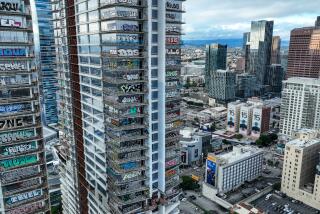Towers of Light Pierce the Darkness of Evil
New Yorkers feel conflicted about how to memorialize ground zero.
Many of us have especially strong feelings about the erection of viewing platforms at the site. It’s vulgar, we feel, to spectate at a mass grave, shameful to desecrate a massive funeral pyre--which is, literally, what ground zero was until recently, burning for months and incinerating so many of the missing, presumed dead. Gawking tourists dishonor the place. It’s in unspeakably poor taste to make the site a destination, like selling tickets at Srebrenica.
Because we live here and we’ve seen ground zero up close, we also know that pictures will never do it justice. The scale of the devastation gets lost in a lens, no matter how wide-angled. You need to see it in person to feel the shock.
It changes you.
It did me. About a month after the attack, I was driving one night in lower Manhattan. I was late for an appointment, and I’d gotten lost in the maze of one-way streets down there. I was whipping around madly, desperate to find my way out, when suddenly, I turned a sharp corner onto a dead end. There, in front of me, out of nowhere, filling my field of vision, was ground zero. The sight pinned me to my seat.
The crews had the huge, garish spotlights propped high above the pit, searing down their brutal whiter than white light like the coldest, most unforgiving of suns. The angry, gnarled, smoldering wreckage, piled story upon story upon story was so immediate, so palpable that it seemed to be living, like some horrid industrial dragon breathing in its sleep.
But that wasn’t the worst of it. The sight of the smaller surrounding buildings hit harder. Still standing there, clustered about the epicenter, with the black, blank spaces behind every shattered window gaping like a mouthful of missing teeth, they remained.
Happening on it this way, out of the murky quotidian streets, was like coming upon the wreck of the Titanic in the depths of the sprawling North Atlantic--nothing, nothing, nothing, then suddenly, all at once, monstrosity, history, grief, fright and a disbelief so intense my brain could not embrace it. I felt diminished.
Six months ago, from the window of my East Village apartment, I saw the towers burning impossibly, gorgeously orange and black against an opaque blue September sky. Now, when I look out that same window, I see the twin luminescent beams, assertive and calm, reaching into the sleepless city night. And it seems from here that many aircraft on the flight paths to LaGuardia or JFK make a point of flying low, passing through the shafts as if saluting, communing, partaking or maybe just offering the best view.
It would be quite something, I imagine, to traverse that now hallowed airspace, the very space the towers used to occupy, the very space in which those poor hijacked passengers and office workers died, not in an airplane determined to crash, but in one destined to proceed.
I envision the aircraft cabin and each individual face within it illuminated for a few seconds by that strange penetrating upward light. I envision a smile of solidarity passing among anonymous travelers, a small tribute both to the victims and to one another for having carried on in the face of darkness.
More to Read
Sign up for Essential California
The most important California stories and recommendations in your inbox every morning.
You may occasionally receive promotional content from the Los Angeles Times.










